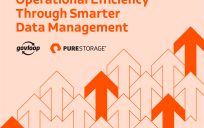Data can save lives, as North Carolina is proving. By standardizing, integrating and sharing data, the state has been able to provide better health care to those who visit its hospitals. In the medical field, accessible health care information is vital to patients’ wellbeing, and in emergency rooms, its presence or absence can be the difference between life and death.
The North Carolina Government Data Analytics Center (GDAC), within the Information Technology (IT) Department, is working hard so that patient information is not lost in translation as it goes from one provider to the next. If health information is immediately and accurately available to health care providers, treatment outcomes will improve.
“This is really putting data into health care providers’ hands,” said John Correllus, chief data officer (CDO) for North Carolina and GDAC Director. “From an operational perspective, it really allows the health care providers to see integrated clinical patient data to support better health care delivery.”
The official name of the program is NC HealthConnex, and it had enrolled more than 11,000 organizations as of August 2019. Those who have agreed to the health information exchange include a wide array of private practices, clinics and departments.
Moreover, program participants are not confined by state borders. In fact, external local, state and national agencies have signed up to share patient data on allergies, medications and behavioral health.
The U.S. Veterans Affairs Department recently enrolled in NC HealthConnex. With more than 800,000 veterans, North Carolina is the fastest-growing veterans’ health region in the United States.
It’s free for health care providers to join, and the expectation is that overall costs to treat patients – and possibly the cost to patients – will decrease significantly with the elimination of duplicative tests, information acquisition and lost records. The North Carolina General Assembly currently funds NC HealthConnex at $9 million annually.
In other areas, North Carolina is managing more than 25 data initiatives. But contrary to stretching the state’s resources thin, the projects are bringing agencies and government bodies across communities closer together. Working through a centralized office, the state is aggregating all sorts of information, such as data on crimes and performance management, within the IT Department’s data division to deliver better services to citizens across a variety of fields.
Important to building out these value-added data projects was a problems-based approach, Correllus said. He encouraged those interested in using data to first ask how it could solve organizational challenges and then “start small, but think enterprise.” That approach has netted North Carolina expansive gains in citizen services such as health care and criminal justice.

“I get very excited when I get an opportunity to use new technologies, to think about the data visualization and all these various technologies,” Correllus said. “That’s all well and good, but it’s really about delivering on some type of value.”
This blog post is an excerpt from GovLoop’s recent guide “7 Tips to Transform Your Data Into Compelling Stories.” Download the full guide here.
Photo credit: Hush Naidoo on Unsplash





Leave a Reply
You must be logged in to post a comment.